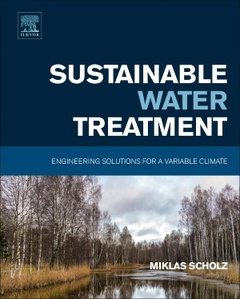Sustainable Water Treatment Engineering Solutions for a Variable Climate
Auteur : Scholz Miklas

Sustainable Water Treatment: Engineering Solutions for a Variable Climate covers sustainable water and environmental engineering aspects relevant for the drainage and treatment of storm water and wastewater. The book explains the fundamental science and engineering principles for the student and professional market. Standard and novel design recommendations for sustainable technologies, such as constructed wetlands, sustainable drainage systems and sustainable flood retention basins are provided to account for the interests of professional engineers and environmental scientists. The book presents the latest research findings in wastewater treatment and runoff control that are ideal for academics and senior consultants.
The book offers a challenging, diverse, holistic, multidisciplinary, experimental and modelling-orientated case study, covering topics such as natural wetlands, constructed treatment wetlands for pollution control, sustainable drainage systems managing diffuse pollution, specific applications, such as wetlands treating dye wastewater and ecological sanitation systems recycling treated waters for the irrigation of crops.
1. Introduction to Sustainable Water Management2. The Reconnaissance Drought Index3. Temporal hydrologic anomalies coupled with drought impact for a river flow regime4. Mineral and biological contamination of soil and Chillies irrigated with domestic wastewater treated by wetlands5. Recycling of domestic wastewater treated by wetlands for irrigation of two generations of Chillies6. Comparative study of domestic wastewater treatment by mature vertical-flow constructed wetlands and artificial ponds7. Treatment of contaminated greywater using pelletised mine water sludge8. Dye wastewater treatment by vertical-flow constructed wetlands9. Shallow pond systems planted with duckweed treating azo dyes10. Tree species for use in urban areas in temperate and oceanic climates11. Feature selection methods for classifying sustainable flood retention basins12. Predicting dam failure risk for sustainable flood retention basins
Students, professionals and academics inprocess,chemical and environmental engineering, environmental science, environmental management, ecology and microbiology
Local authorities and non-governmental organizations
DProf. Prof. Miklas Scholz, cand ing, BEng (equiv), PgC, MSc, PhD, DSc, CWEM, CEnv, CSci, CEng, FHEA, FIEMA, FCIWEM, FICE, Fellow of IWA, Fellow of IETI is a Senior Expert in Water Management at atene KOM, Germany and a Distinguished Professor at Johannesburg University, South Africa. Miklas holds the Chair in Civil Engineering as a Professor at The University of Salford, United Kingdom, and is a Senior Researcher at the South Ural State University, The Russian Federation. He is also a Technical Specialist for Nexus by Sweden and a Hydraulic Engineer at Kunststoff-Technik Adams, Germany. He has published 8 books and 314 journal articles. Prof. Scholz has total citations of about 13718 (8569 citations since 2018), resulting in an h-index of 57 and an i10-Index of 227. He belongs to the top 2% academics regarding the i10-index in the past five years. Miklas also belongs to the World's Top 2% Scientists by Stanford University. A bibliometric analysis of all constructed wetland-related publications and corresponding authors with a minimum number of 20 publications and 100 citations indicates that Miklas is on place 5 in the world of about 70 authors (including those who have sadly passed away). In 2019, Prof. Scholz was awarded EURO 7M for the EU H2020 REA project Water Retention and Nutrient Recycling in Soils and Streams for Improved Agricultural Production (WATERAGRI). He received EURO 1.52M for the JPI Water 2018 project Research-based Assessment of Integrated approaches to Nature-based SOLUTIONS (RAINSOLUTIONS).
Author's expertise:
Sustainability; civil engineering; environmental engineering; agricultural engineering; environmental science; water resources engineering; agricultural water management; nature-based solution; pollution control; biological filtration; wastewater treatment; decision support system; treatment wetland; integrated constructed wetland; engineering hydrology; storm water management; sustainable flood retention basin; dam risk
- Explains the fundamental science and engineering principles behind each topic
- Provides an easy-to-understand, descriptive overview of complex ‘black box’ drainage and treatment systems and general design issues involved
- Includes a comprehensive analysis of asset performance, modelling of treatment processes, and an assessment of sustainability and economics
Date de parution : 09-2018
Ouvrage de 352 p.
19x23.3 cm
Thèmes de Sustainable Water Treatment :
Mots-clés :
Acid Blue 113; Adaptation of crops; Adsorption; Aeration; Agglomerative clustering; Algae; Ammonia; Anthropogenic pressure; Artificial neural network; Basic Red 46; Biochemical oxygen demand; Biological treatment; Biological waste treatment; Calcium; Cementochre pellets; Chemical oxygen demand; Classification; Climate alteration; Climate change; Color red; Colorant removal; Common ash; Common reed; Constructed wetland; Crop quality standard; Dam Height; Dam Length; Dam safety; Damage caused by trees; Damming; Decision-making; Domestic wastewater; Drought; Drought indicator; Duckweed; Ecological sanitation; Ecotechnology; Flood Water Surface Area; Flood control; Fruiting vegetable; Graywater; Horse chestnut; Hydrological processes; Hydrology; Indicator of hydrological alteration; Information Gain; Integrated water resource; Iron oxide; K-nearest neighbors; Kerb; Lime; Marketable crop yield; Mature biomass; Maximum Flood Water Volume; Metals; Microbial contamination; Mutual Information; Natural purification system; Naïve Bayes; Nitrate; Nitrogen removal; Norway maple; Nutrients; Ochre; Pathogens; Permeable pavement; Phosphorus; Phragmites australis; Polishing treatment step; Pond; Potassium; Potential drought risk; Potential evapotranspiration; Precipitation; Pretreated wastewater reuse; Rapid screening tool; Reed bed filter; Regional arid climatic variability; Relief; Retention time; Spatial risk distribution map; Stabilization pond; Support vector machine; Sustainable Flood Retention Basin; Sustainable agricultural water management; Sustainable drainage; Sustainable drainage system; Sustainable flood risk management; Sustainable water resources management; Sycamore; Synthetic graywater; Textile wastewater treatment; Total coliforms; Trace minerals; Treatment wetland; Trend detection; Variable climate; Wastewater; Water quality assessment; Water resources engineering



